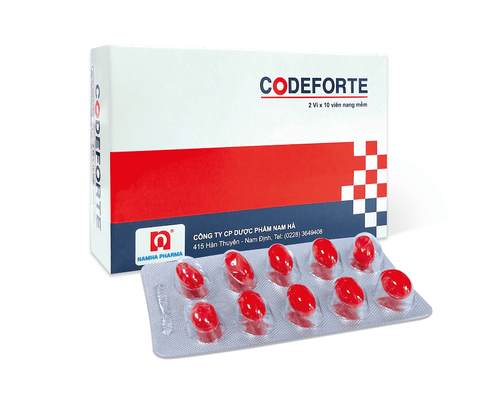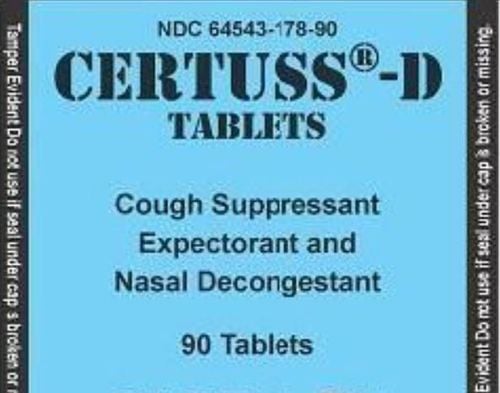This is an automatically translated article.
Codepect drug is made in the form of soft capsules, containing Codein Phosphate and Glyceryl Guaiacolate. It is used to relieve cough, loosen phlegm, and relieve mild pain.
1. What does Codepect do?
What is Codepect? The drug has ingredients including Codeine Phosphate 10mg, Glyceryl Guaiacolate 100mg and excipients (lecithin, white beeswax, hydrogenated vegetable oil, soybean oil). What disease does Codepect treat? With the main ingredients being Codein and Glyceryl Guaiacolate, Codepect has the effect of reducing cough, expectorant and mild pain relief. In addition, the drug is also used in cases of diarrhea (due to the ingredient containing Codeine). Codeine has a reducing effect (due to direct action on the cough center in the medulla oblongata, drying respiratory secretions, increasing the consistency of bronchial secretions). Glyceryl Guaiacolate reduces the viscosity of secretions, increases the effectiveness of the cough reflex and the activity of the cilia, aids in the removal of mucus in the bronchi.
Codepect is indicated in the following cases:
Treatment of cough conditions with typical symptoms: Dry cough, cough caused by wind, cough due to weather, cough with phlegm, cough at night,...; Mild pain relief; Reduce symptoms of runny nose, flu (more effective when combined with non-steroidal anti-inflammatory drugs). Contraindications to using Codepect:
Children under 12 years old; Patients with acute respiratory failure or hypersensitivity to the components of the drug; Patients with genes that metabolise drugs via CYP2D6 super fast; People with a history of liver disease, chronic obstructive pulmonary disease (COPD), a history of alcoholism; Patients with increased intracranial pressure, traumatic brain injury, coma, epilepsy; Patients with paralytic ileus, digestive disorders, intestinal motility dysfunction; Persons under 18 years of age with a history of tonsillectomy/VA; People who are using tricyclic antidepressants, MAOIs.
2. How to use and dose Codepect
Codepect is used orally in different doses for children and adults. Specifically:
Adults: Take a dose of 2 - 3 tablets/time x 2 - 3 times/day; Children over 12 years old: Use the drug according to the doctor's regimen. *Note:
Start using the drug from the lowest effective dose, the dose should be reduced in elderly patients. The minimum interval between 2 consecutive doses of the drug is 6 hours. Treatment should not be more than 7 consecutive days, the maximum daily dose is 12 tablets; If within 3 days the patient does not notice any signs of cough and pain relief, they should inform the doctor about the symptoms, the history of taking the medicine; Codepect can be addictive if taken in high doses and for a long time. Discontinuation of the drug should be done gradually, reducing the dose gradually, not suddenly. When using Codepect drug overdose, patients may experience symptoms such as central nervous system disorders, respiratory depression, pupil dilation, coma or hypothermia, dizziness, drowsiness, convulsions, hangover, nervousness, restlessness, ... The treatment is to continuously monitor the patient's vital signs, immediately notify the doctor. Consideration should be given to the use of activated charcoal to enhance drug absorption. In severe cases, the patient can be given Naloxone (opioid antagonist). The patient's family members and doctors should also closely monitor the patient's symptoms for at least 4 hours after taking Naloxone.
3. Side effects of the drug Codepect
When using Codepect, patients may experience some side effects such as:
Common: Headache, dizziness, thirst, strange feeling, nausea, vomiting, constipation, urinary retention, little urine, rapid pulse, slow pulse, weakness, fatigue, palpitations, orthostatic hypotension; Uncommon: Skin pruritus, urticaria, respiratory depression, restlessness, sedation, euphoria, stomach pain, bile duct spasm; Rare: Anaphylactic reactions, hallucinations, convulsions, visual disturbances, disorientation, circulatory failure, flushing, sweating, fatigue; Addiction: Using codeine (component of Codepect) for a long time at a dose of 240 - 500mg/day can cause addiction. Common manifestations include restlessness, tremors, sweating, muscle twitching, runny nose,... Patients may be psychologically and physically dependent on the drug and cause addiction. When experiencing side effects of the drug, the patient should inform the doctor to receive appropriate advice.
4. Be careful when using Codepect
Some notes for patients to remember before and while taking Codepect:
Caution when using Codepect in patients with rare genetic problems, lack of galactose digestive enzymes, so it can't be digested. lead to diarrhea ; Use caution when using Codepect in patients with a history of neurological diseases such as convulsions, epilepsy; Use Codepect with caution in patients with coronary artery disease, diabetes, atherosclerosis and angina pectoris; Use caution when using Codepect when driving and operating machinery; Codepect should be used with caution in patients with prostate enlargement, thyroid or adrenal dysfunction; Codepect should be used with caution in patients with a history of opioid toxicity, hypothyroidism, and adrenal insufficiency; Use caution when combining Codepect with benzodiazepines, phenothiazines, barbiturates, monoamine oxidase inhibitors, tricyclic antidepressants; Use caution when using Codepect in pregnant women, especially during the first 3 months of pregnancy. Use of Codepect during pregnancy may cause neonatal drug addiction syndrome. Codeine contained in Codepect can cause difficulties during labor and increase the risk of pneumonia and respiratory failure in the newborn; Codepect should not be used by women who are breastfeeding; Codeine in Codepect can cause drowsiness, so do not use the drug to drive or operate machinery.
5. Codepect . drug interactions
Some drug interactions with Codepect include:
Using Codepect drug simultaneously with alcohol will increase the possibility of lowering blood pressure, sedation of alcohol and may cause coma; Co-administration of Codepect with sedative-hypnotic drugs such as phenobarbital, diazepam can cause depression, central nervous system depression or coma, even death; Co-administration of Codepect with antiarrhythmic drugs may reduce the absorption and effect of antiarrhythmic drugs; Co-administration of Codepect with tricyclic antidepressants increases bioavailability and increases the risk of drug toxicity; Concomitant use of Codepect and antihistamines increases the risk of depression, central nervous system disorders; Co-administration of Codepect with antipsychotics increases the antihypertensive and sedative effects; Co-administration of Codepect with aspirin and paracetamol increases the analgesic effect of codeine; Co-administration of Codepect with quinidine reduces or loses the analgesic effect of codeine; Codeine in the drug Codepect reduces the metabolism of cyclosporin (by inhibiting cytochrome P450 enzymes); Co-administration of Codepect with drugs like Domperidone, Metoclopramide can cause digestive disorders. To ensure the effectiveness and safety of using Codepect, patients should absolutely follow all instructions given by their doctor on dosage and how to use the drug.
Please dial HOTLINE for more information or register for an appointment HERE. Download MyVinmec app to make appointments faster and to manage your bookings easily.













